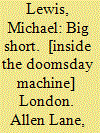|
|
|
Sort Order |
|
|
|
Items / Page
|
|
|
|
|
|
|
| Srl | Item |
| 1 |
ID:
096781


|
|
|
|
|
| Publication |
London, Allen Lane, 2010..
|
| Description |
xviii, 266p
|
| Standard Number |
9781846142574, hbk
|
|
|
|
|
|
|
|
|
|
|
|
Copies: C:1/I:0,R:0,Q:0
Circulation
| Accession# | Call# | Current Location | Status | Policy | Location |
| 054998 | 330.973/LEW 054998 | Main | On Shelf | General | |
|
|
|
|
| 2 |
ID:
105289


|
|
|
|
|
| Publication |
2011.
|
| Summary/Abstract |
apan's early postwar leadership and American occupiers alike asserted that democratization was a new lesson that the Japanese public would have to learn. In fact, the ideas of democratic reformers had been broadcast to a large audience as feasible programmes decades before 1945. Miyatake Gaikotsu, the editor of Democracy in 1919, outlined the benefits that democratic reforms might provide in a post-World War I world. Decades later, Japanese people faced a new postwar struggle, not as victors but as the vanquished. Gaikotsu, writing in 1945, reflected on democracy in these new circumstances in his study, Amerika-sama. Although the situation was vastly different, victory and defeat in world wars had opened paths to new possibilities. This paper examines Gaikotsu's prewar writings as prescient prescriptions that he revisits in his essay Amerika-sama, or 'Honourable America,' at the point they begin to be played out, in some instances only partially and at times for ill as well as good, in occupied Japan. These reflections strikingly demonstrate the continuity of ideas during the prewar past and postwar present. Amerika-sama is a representative expression of many programmes Gaikotsu and likeminded humanistic activists attempted to put into practice from the late nineteenth century until they were suppressed during the wartime years. Mainstream political parties, prewar and postwar, often found it difficult to embrace Gaikotsu's ideas and political programmes. Nevertheless, the general public embraced them and they now find legal support in the Constitution of Japan.
|
|
|
|
|
|
|
|
|
|
|
|
|
|
|
|
|
|
|
|
|